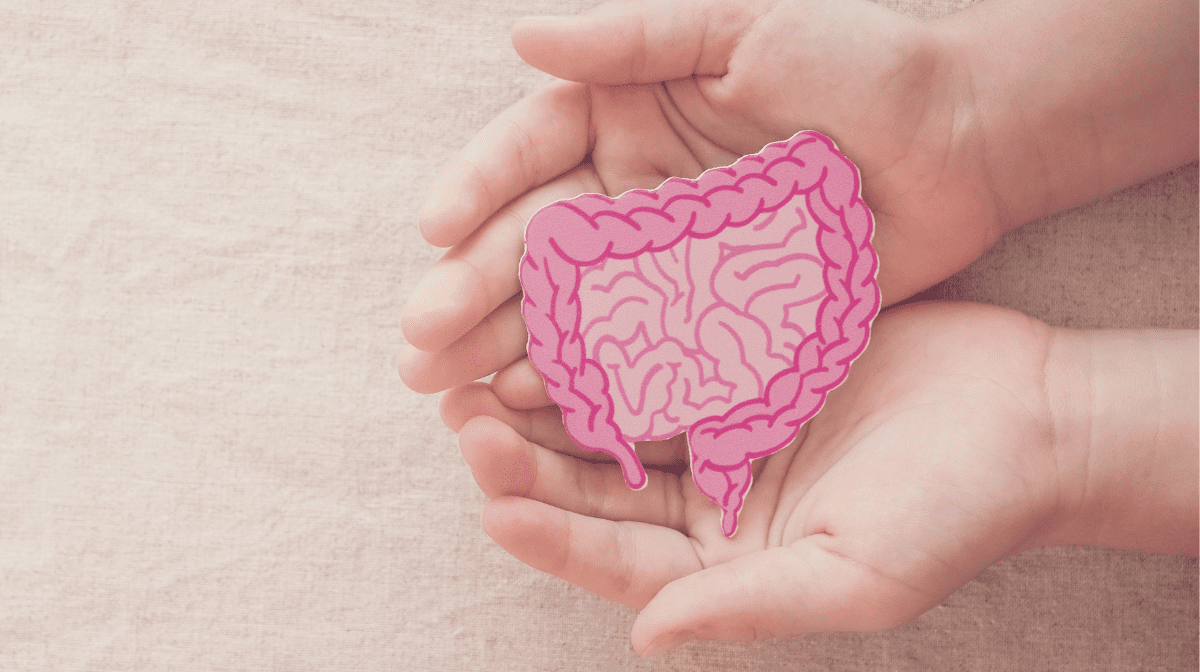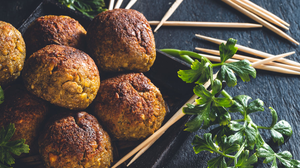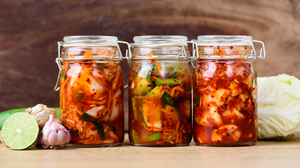
Feeling bloated, getting indigestion, and experiencing IBS-like symptoms are the usual tell-tale signs your gut might not be in the best of health. But an unhealthy gut doesn't just impact our digestion – it also plays a role in our immunity, our mental well-being, and even our sleep. If you are not only experiencing digestive problems but also find yourself feeling tired and becoming sick too often, the source of the problem may actually be your gut.
It's always important to seek medical advice if you have noticed major negative changes in your body and your health. But if you find there’s nothing particularly wrong, yet you know you’re still not feeling your best and still can't figure out why, taking care of your gut health might just be the key to helping you start to feel much better.
The gut microbiome
First things first – if you suspect you have an unhealthy gut, you’ll want to get a good understanding of what’s going on in there. The gut – which is the term for your mouth, throat, stomach, and colon collectively – contains numerous living, non-human bacteria. This complex ecosystem of microorganisms that reside in our gastrointestinal tract is also known as the gut microbiome.
We actually share our gut with at least 100 trillion microbial cells.[1] Although this large number might seem a bit spooky, many of these bacteria play an important, positive role in digestion, metabolism, nutrition, and immune function – and they may even help to stave off obesity and gastrointestinal conditions such as inflammatory bowel disease.[2] Probiotics – the term for the beneficial bacteria that reside in the gut – are vital for healthy digestive function, and a healthy body overall.
The importance of balance
Just like in any ecosystem, the array of bacteria that make up the gut microbiome has to exist in balance to thrive. The presence of numerous good bacteria – probiotics – in the gut leaves less room for harmful bacteria and pathogens to survive there. It follows, then, that keeping probiotic numbers high can help to support your immunity. Probiotics come in supplement form and can also be derived from the food we eat – particularly fermented foods and certain vegetables. They are also found to be more abundant in the digestive tracts of people who exercise regularly,[3] and who are not stressed or sleep-deprived.[4]
Dysbiosis – an imbalance in gut bacteria – can have serious consequences on health. Numerous studies have linked dysbiosis to allergies, as well as dermatological issues such as acne, and even chronic fatigue.[5] Dysbiosis is also known as a leaky gut – that’s because an unhealthy gut microbiome is often accompanied by an intestinal lining with cracks or holes, which tends to ‘leak’ things, as well as let the wrong things in.[6] A healthy gut, however, has a tight lining that keeps everything where it’s meant to be.
Warning signs that you have an unhealthy gut
If there’s a chance you have an unhealthy gut – one that’s low in the ‘good’ kinds of bacteria, or even a leaky gut – it's important to know and recognise the signs, so you can stop things from getting worse. Some of the symptoms of an unhealthy gut don’t always manifest obviously as gut-related issues, but may play a part in other aspects of your health.
Here are 3 warning signs of an unhealthy gut you may not have known to look for:
1. You’re not sleeping well
If your gut microbiome changes composition or diversity, or you have a leaky gut, inflammation can occur. Inflammation can have a negative effect on your sleep, as well as other aspects of your health.[7] Studies have also demonstrated an association between a healthy microbiome, and good sleep in older people.[8] Therefore, if counting sheep isn’t working as well as it used to – perhaps your gut is causing you to toss and turn.
2. You’re breaking out more often
Your skin has a unique microbiome, which can influence and be influenced by your gut microbiome.[9] That means what you put in your body can affect the health of your skin. Not only has dysbiosis been associated with acne in a number of studies,[10] eczema has also been linked to the gut.[11] Next time you have a breakout – it may be worth adding a probiotic supplement to your skincare routine.
3. You feel moody, anxious, or depressed
Our gut is connected to our central nervous system via the gut-brain axis: a bidirectional communication network made up of nerves, chemicals, and hormones.[12] Because of this connection, an unhealthy gut can influence our mental state, and vice versa.[13]
Recent scientific evidence suggests that the diversity and composition of bacterial strains in the gut are significantly different in people with mood disorders – such as major depressive disorder and bipolar – in comparison to healthy individuals.[14]
Preclinical studies have even demonstrated antidepressant-like effects for specific probiotics.[15]
If you’re worried your gut is affecting your mood, try a probiotic supplement that is specially formulated to support mental wellness. Alflorex® by Precision Biotics was developed to help support gut health in times of stress.
4 Foods to avoid for good gut health
Many of us wonder if certain foods are particularly bad for our gut health. While research on this topic is ongoing, there are several foods you may want to avoid if you're trying to improve your gut health and decrease negative gastrointestinal symptoms. This list doesn’t mean you have to cut out any of your favourite foods for good – just be mindful of enjoying them in small doses! Here are some of the worst offenders:
1. Sugar
Too much sugar can lead to an overgrowth of the bad kind of bacteria in the gut,[16] which, you guessed it – can lead to dysbiosis and other nasty symptoms. Of course, most of us love our sugary treats, but sometimes swapping them out for some fibre-filled fruits like apples or kiwis can do our gut lots of good.
2. Artificial sweeteners
What about artificial sweeteners then? Sucralose, also known as Splenda, is a common sweetener used as a sugar substitute. But studies in mice have associated Splenda intake with a significantly altered gut microbiome, as well as a changed intestinal barrier function.[17]
Some studies also suggest that maltitol, a sugar alcohol, may be associated with a number of uncomfortable gastrointestinal symptoms, including diarrhea and bloating.[18]
3. Processed foods
Processed foods are often high in sugar, salt, and unhealthy fats, all of which can be detrimental to your gut and overall health. They’re typically lower in fibre and other nutrients – so when you eat processed foods, you’re also missing out on the stuff your gut bacteria need to survive.
4. Alcohol
When you drink alcohol, the liver produces acetate, which can lead to a sudden growth in gut bacteria. This effect can be harmful, as scientists have found that it may favour the growth of certain strains of harmful bacteria in particular – so it won’t be just the good kind.[19]
Which foods to eat to support good gut health
Fortunately, there are many ways to support good bacteria in the gut and maintain a healthy gut microbiome. Eating a diet rich in whole foods like fruits, vegetables, and whole grains can support a healthy gut microbiome. Probiotic and prebiotic foods are also the way to go. Garlic contains prebiotics, which are a type of fibre that feeds the good bacteria in your gut. Fermented foods such as yogurt, kefir, kimchi, and sauerkraut, however, are known for being high in probiotics.
You can drink your probiotics too – try Kombucha, a fermented tea drink, if you want some extra probiotics and other beneficial nutrients.
Olives can also be beneficial for gut health, because they contain polyphenols: antioxidants that may help to prevent inflammation.[20]
References:
[1] https://www.ncbi.nlm.nih.gov/pmc/articles/PMC3667473/#:~:text=Our%20gut%20harbours%20a%20complex,inflammatory%20bowel%20disease%20and%20obesity.
[2] https://www.ncbi.nlm.nih.gov/pmc/articles/PMC3667473/#:~:text=Our%20gut%20harbours%20a%20complex,inflammatory%20bowel%20disease%20and%20obesity.
[3] https://atlasbiomed.com/blog/how-does-exercise-affect-gut-microbiome/
[4] https://www.ncbi.nlm.nih.gov/pmc/articles/PMC6779243/
[5] https://www.health.harvard.edu/blog/leaky-gut-what-is-it-and-what-does-it-mean-for-you-2017092212451
[6] https://www.health.harvard.edu/blog/leaky-gut-what-is-it-and-what-does-it-mean-for-you-2017092212451
[7] https://www.drmichaelgelb.com/how-poor-gut-health-and-trouble-sleeping-are-connected/
[8] https://www.drmichaelgelb.com/how-poor-gut-health-and-trouble-sleeping-are-connected/
[9] https://www.medicalnewstoday.com/articles/eczema-gut-health
[10] https://www.health.harvard.edu/blog/leaky-gut-what-is-it-and-what-does-it-mean-for-you-2017092212451
[11] https://www.medicalnewstoday.com/articles/eczema-gut-health
[12] https://www.ncbi.nlm.nih.gov/pmc/articles/PMC4367209/#:~:text=The%20gut%2Dbrain%20axis%20(GBA,microbiota%20in%20influencing%20these%20interactions.
https://www.ncbi.nlm.nih.gov/pmc/articles/PMC4367209/#:~:text=The%20gut%2Dbrain%20axis%20(GBA,microbiota%20in%20influencing%20these%20interactions.
[13] https://www.health.harvard.edu/diseases-and-conditions/the-gut-brain-connection
[14] https://www.ncbi.nlm.nih.gov/pmc/articles/PMC6389720/
[15] https://www.sciencedirect.com/science/article/pii/S0022395615000655?via%3Dihub
[16] https://www.mdpi.com/2072-6643/12/5/1348
[17] https://www.frontiersin.org/articles/10.3389/fnut.2022.848392/full
[18] https://universityhealthnews.com/daily/nutrition/4-common-maltitol-side-effects-more-reasons-to-limit-your-artificial-sweetener-intake/
[19] https://www.contemporaryclinic.com/view/study-excessive-alcohol-consumption-causes-gut-microbiome-imbalance
[20] https://www.ncbi.nlm.nih.gov/pmc/articles/PMC8300823/









